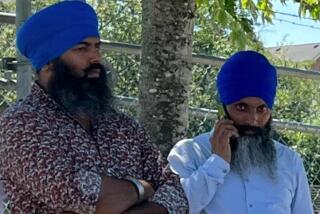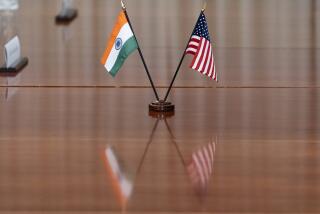Punjabi Minister Killed by Car Bomb in India : Terrorism: Separatist Sikhs claim responsibility for highest-level assassination in four years.
- Share via
NEW DELHI — In India’s highest-level political assassination in four years, Beant Singh, chief minister of Punjab state, was killed Thursday when a powerful bomb exploded as he got into his limousine.
A Sikh separatist group claimed responsibility for the blast, which killed 12 others.
The explosion occurred after Singh, 73, left his second-floor office in the civil secretariat in Chandigarh, the city that serves as Punjab’s administrative capital. As the chief minister got into his car at 5:07 p.m., it blew up.
Singh’s automobile and two escort vehicles were torn to pieces. At least three commandos attached to his security detail were killed.
The bomb was so strong that it shattered windows up to the sixth floor of the 10-story government building and blew away part of the porch in front of the VIP entrance.
The elderly official of the ruling Congress (I) party had been Punjab’s chief minister since February, 1992. Although a Sikh himself, he had overseen an effective--if ruthless and controversial--crackdown on armed Sikh militancy in the state.
Singh’s murder, and the ability of his killers to breach extraordinarily tight security and strike at their target with devastating might, made officials in other parts of India jittery about the possibility of coordinated attacks.
In New Delhi, the capital, the 65,000-strong police force was put on “high alert.” Officers were deployed at movie houses, markets, railroad stations, shopping complexes and Indira Gandhi International Airport, and anti-terrorist commandos were patrolling particularly sensitive sites.
In faraway West Bengal, authorities declared a statewide alert. Security measures were also stepped up in Haryana and Rajasthan, which border on Punjab.
Prime Minister P.V. Narasimha Rao vowed to track down those responsible for the death of a “great patriot and leader,” adding: “Such acts of terrorism can only be perpetrated by people who have taken leave of their senses.”
The prime minister, also the national leader of the Congress (I), said the murder came as a “great shock.” For India’s leadership, already combatting a wearying five-year separatist insurgency in the state of Jammu and Kashmir, the Punjab bombing raised the specter of revived militancy in yet another state.
*
In a fax late Thursday to the United News of India press service, the militant Sikh group Babbar Khalsa--which India has said is aided by Pakistan’s Inter-Services Intelligence agency--asserted that it had killed Singh.
It was the most important assassination in the country since former Prime Minister Rajiv Gandhi was slain by a suicide bomber as he campaigned near Madras in Tamil Nadu state on May 21, 1991.
Punjab Police Director Gen. K. P. S. Gill, who ran downstairs from his fourth-floor office when he heard the explosion Thursday, told reporters that evening that it was not yet clear whether the bomb had been planted in the chief minister’s car or another in his motorcade.
Gill said Singh had been constantly under threat and that vehicles used by him were regularly checked. Since Indian Independence Day on Aug. 15, Singh’s bodyguards had been on special alert. The tight security made the success of the assassins more of a mystery.
Singh became Punjab’s chief minister after elections were held in February, 1992, to end six years of direct rule by New Delhi.
Sikh separatists ordered a boycott, and only 20% of voters turned out. Singh’s government took office with the backing of only 9% of the electorate and a shaky mandate, at best, from the state’s Sikh majority.
*
His political foes in the rival Akali Dal party considered him nothing more than the central government’s henchman in Punjab.
When Singh took office, however, he set himself the targets of snuffing out violence, restoring the democratic process and promoting further economic and social development of a state that has traditionally been India’s granary. Though the militancy went into a steep decline in July, 1992, and seemed to have virtually vanished of late, Singh was far from satisfied.
“My top priority is still the maintenance of the law and order situation,” he told the Hindu, a daily newspaper, in July. “We want to consolidate our gains on this front.”
More to Read
Sign up for Essential California
The most important California stories and recommendations in your inbox every morning.
You may occasionally receive promotional content from the Los Angeles Times.













